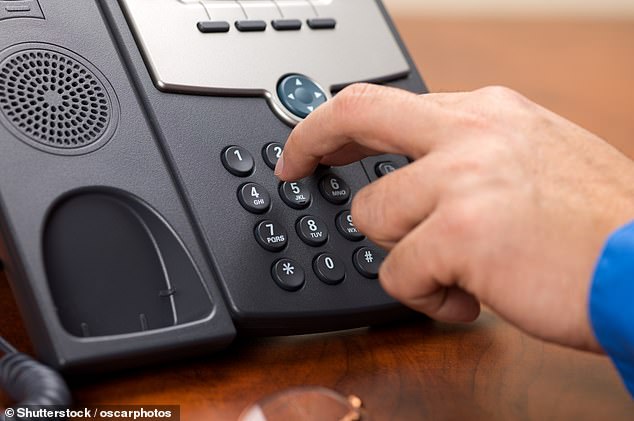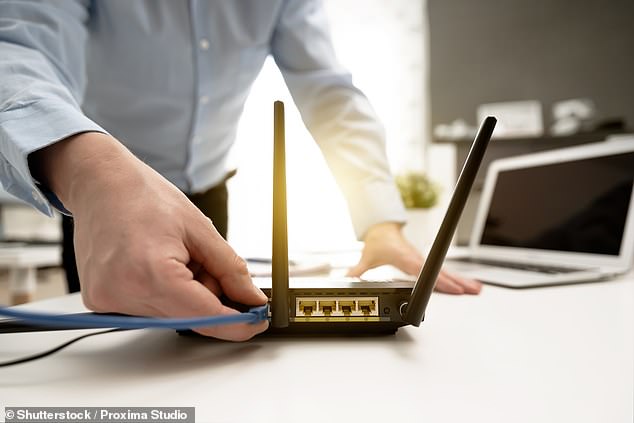Recently widowed Patricia Skuce was left in tears after getting an email from BT suggesting a doctor’s note might be needed if she wanted help changing her phone service.
The 87-year-old suffers from poor health, with hearing difficulties and mobility issues, and lost her beloved husband Ralph to cancer last year.
Patricia’s daughter Pauline contacted BT after it sent her mother a letter in October saying that the phone line at her home in St Albans, Hertfordshire, would be switched over from analogue to digital.
The switch is part of the Digital Voice roll out across the country. Pauline explained her mother’s vulnerabilities and asked if she could procure help with the switch.
Pauline says: ‘I was staggered to procure an insulting email back that included details on how my mother could be registered as vulnerable by being put on a priority list that would demand a doctor’s certificate.’

Sick note: BT said a frail 87-year-old pensioner would need a note from her doctor before they would agree to help her switch her landline over to their new digital network
Pauline adds: ‘It left us both in tears. Why would they not simply take my word? It was hurtful and I see no reason why she must be forced to visit the doctor and plead for vital help.’
Patricia is just one of thousands of vulnerable customers confused by the Digital Voice switch.
The Digital Voice programme is running over the next couple of years and will proceed ten million customers to fibre cables that use new Voice over Internet Protocol (VoIP) technology for making calls.
In total, 29 million homes in Britain must make the change. Phone numbers will not be affected by the digital switch.
But customers have been left confused about how they can get help with the switch and what they need to do to demonstrate they are vulnerable and therefore eligible for preserve.
BT had sent Pauline an email from its ‘resolutions team’, about how her mother could be registered as vulnerable so she could procure extra preserve. It contained a link to a document entitled ‘Putting you first’.
This asked for paperwork to be filled out by the BT customer and signed by a doctor or hospital consultant.
The document explained that ‘once we procure the application we will register your mother’s account as vulnerable’.
Pauline assumed that she would have to supply this requested evidence in order for her mother to get help with the digital switchover.
However, BT tells Money Mail that a form signed by a medical professional is not necessary.
In order to be ready for the switch, households need to take various steps and make choices. For example, for your landline to continue working after the change, you need to plug your old handset line into an adapter that can be plugged into an internet cable socket, plug your old phone into an internet hub or buy a new digital phone.

Digital switch: Landline users will need to plug old handsets into an adapter that can be plugged into an internet cable socket, an internet hub or buy a new digital phone
Not all feel able to do it alone, but getting help can be confusing.
BT halted the rollout a year ago after telecoms regulator Ofcom said it must supply better preserve for vulnerable customers.
This is because digital phones must be plugged into an electricity socket to work, so in a power cut, households may not be able to contact 999 emergency services on the phone.
Vulnerable households need to ensure they have an alternative in place, such as a mobile phone or an emergency battery pack to plug in for the old landline phone.
Pauline says the family has suffered two power cuts over recent weeks when the landline still worked.
As part of the digital switch, all householders — vulnerable or not — must pull their landline cable out of the traditional socket and plug it into a £20 adapter or new £200 hub that connects lines to the internet.
Alternatively, they can get rid of the old analogue phone and buy a compatible new £30 digital handset.
All BT customers should be given ‘free’ upgrades as part of the proceed. You can pick to have the adapter for free and get £7 off a digital handset. New hubs can also be provided if you have an old one that is not compatible.
Richard Martin, 75, of High Wycombe, Buckinghamshire, is also worried about how vulnerable neighbours are still in the dark about the proceed — and is one of those having to step up to offer help.
He says: ‘The switchover is particularly confusing for the elderly who are not tech savvy and have no idea what is going on.
‘I have vulnerable neighbours who rely on a landline for communication but do not use the internet.
‘I worry that the first thing they will know about Digital Voice is when the phone stops ringing. Many will feel they have been abandoned.’
A BT spokesman says: ‘If you have concerns get in touch on 0330 1234 150. Press option one, option one again — and finally option five. At this point you should be put through to someone who can help.’
The telecoms giant says you do not need a doctor’s note but should explain clearly why you are vulnerable — with those who have health pendants, use only landlines, have no mobile phone signal or have mental or physical disabilities, eligible for help. You could also ask for an engineer visit.
toby.walne@dailymail.co.uk
Some links in this article may be affiliate links. If you click on them we may earn a small commission. That helps us fund This Is Money, and keep it free to use. We do not write articles to encourage products. We do not allow any commercial relationship to affect our editorial independence.



